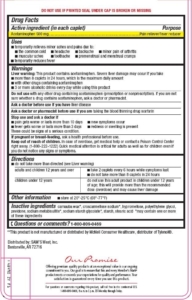Education campaigns improve safe acetaminophen use – National Consumers League
 Acetaminophen is the most commonly used drug ingredient in America. It is found in over 600 of the most commonly used over-the-counter (OTC) and prescription drugs, including Tylenol, Robitussin, Dayquil, Nyquil and so many more. An estimated 50 million Americans take acetaminophen every week. When taken as directed, acetaminophen is safe and effective. Taking too much acetaminophen, however, can cause severe liver damage.
Acetaminophen is the most commonly used drug ingredient in America. It is found in over 600 of the most commonly used over-the-counter (OTC) and prescription drugs, including Tylenol, Robitussin, Dayquil, Nyquil and so many more. An estimated 50 million Americans take acetaminophen every week. When taken as directed, acetaminophen is safe and effective. Taking too much acetaminophen, however, can cause severe liver damage.
Acetaminophen is the most commonly used drug ingredient in America. It is found in over 600 of the most commonly used over-the-counter (OTC) and prescription drugs, including Tylenol, Robitussin, Dayquil, Nyquil and so many more. An estimated 50 million Americans take acetaminophen every week. When taken as directed, acetaminophen is safe and effective. Taking too much acetaminophen, however, can cause severe liver damage.
 Consumer education is a key step to ensuring safe acetaminophen use and preventing overdoses. A new report from the Acetaminophen Awareness Coalition (of which National Consumers League is a founding member) “Acetaminophen: How It’s Used, Preventing Overdose and What We Can Do to Promote Safe Use,” explores the successful impact of ongoing healthcare provider and consumer-led education campaigns. Over the last three years many organizations have launched new campaigns aimed at educating consumers about safe medicine use. Among these efforts is TakeWithCare.org, launched by NCL in 2014 to educate teens on safe use of over-the-counter medications.
Consumer education is a key step to ensuring safe acetaminophen use and preventing overdoses. A new report from the Acetaminophen Awareness Coalition (of which National Consumers League is a founding member) “Acetaminophen: How It’s Used, Preventing Overdose and What We Can Do to Promote Safe Use,” explores the successful impact of ongoing healthcare provider and consumer-led education campaigns. Over the last three years many organizations have launched new campaigns aimed at educating consumers about safe medicine use. Among these efforts is TakeWithCare.org, launched by NCL in 2014 to educate teens on safe use of over-the-counter medications.
The report found that consumer awareness about safe medicine use between 2010 and 2013 improved across the board. In 2010, 90 percent of people said it’s dangerous to exceed maximum doses and 76 percent said they were aware they could overdose by doubling up on multiple medications with the same active ingredient. By 2013 those numbers improved to 98 percent and 81 percent respectively.
Perhaps the most substantial finding from the new report is that consumer education campaigns do work and do help consumers be more informed. In 2010, 78 percent of those surveyed understood that, “exceeding the recommended daily dose of acetaminophen may lead to liver damage.” By 2013 that number increased to 87 percent. Many stakeholders from different backgrounds are working on educating consumers about the dangers of acetaminophen overdose. We must keep up these efforts to reduce unintentional overdosing.
As an organization that runs many consumer education initiatives it is great to know these campaigns truly do create a more informed and healthy consumer base.
So…what is Acetaminophen?
Acetaminophen is the most widely used pain reliever and fever reducer that temporarily relieves minor pains and aches such as those resulting from the common cold, muscle aches, headache, arthritis, allergies, and premenstrual and menstrual cramps.
To find out if a medicine you are taking contains acetaminophen, read the drug facts label. Here’s an example:
When used properly, acetaminophen is safe and effective. Like any medicine, however, there is a limit to how much should be taken in one day. The FDA recommends a maximum daily dose of no more than 4,000 milligrams (mg) of acetaminophen. The amount of acetaminophen in an individual product varies and you can find the amount listed in milligrams on the medicine label. Exceeding the daily limit, or overdosing on acetaminophen can lead to severe liver damage or death. Overdose occurs when consumers take too much at one time or take a second dose before they are supposed to in an effort to help manage the pain. Using multiple medications that contain acetaminophen can also result in misuse or overdose. It is important to read the directions carefully or ask your health care provider before taking any medicine.
Tips to Safely Use Acetaminophen
- Read and follow the medicine label. Reading the labels provides consumers with need-to-know ingredients as well as proper usage directions. Find out if a medicine contains acetaminophen.
- Talk to your pharmacist/physician. Become more aware and informed about your prescribed or over-the-counter medicines. Ask questions about allergies, proper dosage, and how often the product should be used.
- Never take two acetaminophen-containing medicines at the same time. Double check the label, and don’t double up on acetaminophen.
For more information visit, Know Your Dose today!















